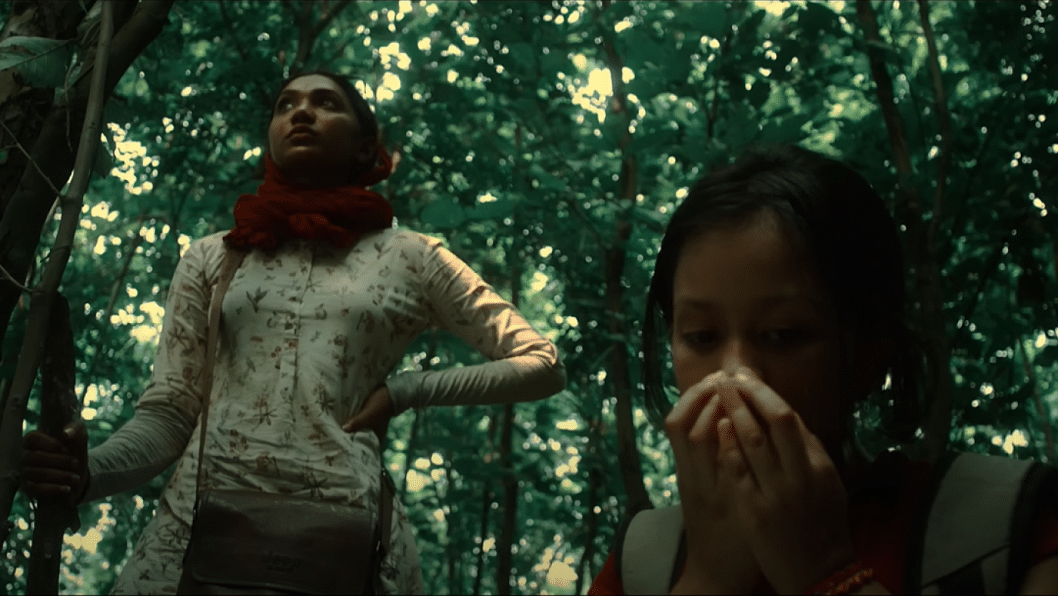Moshari: The hype and beyond

Nuhash Humayun's 22-minute genre short, Moshari, has won multiple honours including the SXSW Grand Jury Award, and awards from the Melbourne International Film Festival, HollyShorts Film Festival, and Short Shorts Film Festival & Asia. And last Monday, Variety revealed that Riz Ahmed and Jordan Peele are set to join team Moshari as executive producers.
It is a win for the whole nation as everyone is rejoicing through social media posts, shares, and tweets all immersed in red and green emojis. Moshari's acclamation situates Bangladeshi film production in the international arena, and amidst all the celebratory frenzy, there is much to unravel. What makes Moshari so great? What developments should viewers and critics expect now that Ahmed and Peele are on board? What changes in the Bangladesh film industry should we hope for?
Since the inception of the genre itself, post-apocalyptic films have always been associated with the Global North. And in an "empire writes back" fashion, Moshari depicts a post-apocalyptic future set in Bangladesh. Instantaneously, viewers are invited to infer the postcolonial narrative that is to unfold.
What I particularly appreciate is the creative decolonial strategy that Nuhash Humayun employs through his lens. The monster in question is a Vampire – the European, blood-sucking, mythical creature; synonymous with the resource-draining affairs in the Global South, initiated by the Global North. What keeps the Vampire at bay? Not garlic, nor a crucifix; but rather a "moshari" (mosquito net) – an everyday object that carries great significance in our part of the world. In his postcolonial Bangladesh, Nuhash takes an everyday object, empowers it, and deploys it against the dominance of the West.
The issue at stake is extremely topical – it enhances the muffled voices that speak from a fractured space, and directs the viewer's gaze towards the nuances of the Bangladeshi experience. And that is exactly what makes Moshari such a great work of art.
Much of the context of the film is relayed through a megaphone announcement: "The Western World that mocked our poverty. Called us the 'Third World.' Sucked our blood dry. They are gone. Yet we survive."
Rob Munday from "Short of the Week" initially calls this instance a "lazy exposition." But later, in a lazy contradiction, says it immerses the viewer in the world. Having said that, there is no doubt that the megaphone announcement in the film forces the postcolonial narrative, and leaves very little room for interpretation.
A filmmaker should ideally guide viewers through their world, mould their perspectives, feed into their perceptions, and form a trajectory through which the narrative unfolds. However, Nuhash Humayun takes an unidirectional approach that lacks the convergence of viewpoints. Moshari could have invited its viewers to imagine alternate realities, a future that is far, yet possible, rather than making such direct declarations.
When we situate ourselves away from the grand narrative, Moshari is also a story about two sisters – "Apu," the older sister played by Sunerah Binte Kamal, and Ayra, the younger sister – and their struggle to survive in a post-apocalyptic world. Nuhash digs deep into the layers of complexities and attempts to amplify the Bangladeshi female voice. As such, Apu taunts the vampire: "Wait till my period. I will show you blood."
It is clear that Nuhash is deploying against the taboo that revolves around openly speaking about menstruation. But was this dialogue necessary, and does it align with the cinematic context? The issue here is the very narrow case of activism that Nuhash opts for.
In a wider context, a woman's physical and emotional turmoil due to a lack of women's rights in Bangladesh fits the situation and setting. In the preceding scenes, Apu is seen walking over shards of glass. Instead of opting for a dramatic dialogue, Nuhash could have attempted to evoke emotions through the audio-visual component of shards piercing through the flesh. It triggers collective inferences to be drawn, and creates a more inclusive space for spectators and critics to be able to engage with what the filmmaker is trying to depict.
In a recent interview with The Daily Star's Entertainment page, regarding the recent association of Ahmed and Peele with Moshari, Nuhash stated – "I still remember the day every producer in Bangladesh told me not to even bother sending this short to film festivals" – pointing towards the toxicity, envy and deliberate hindrance that is prevalent in the Bangladeshi film industry.
This is not the first time Nuhash Humayun has pointed out the rejections and discouragement in his career. In an interview with Authority Magazine, he reflected on his early days as a filmmaker: "When I was starting out everyone said no to me and my ideas. I just got a mix of contradictory advice. I had to learn to pick and choose what to take – some people are jaded and bitter even if they mean well."
I can't help but wonder – did "every producer" come from a place of envy, or was there constructive guidance that Nuhash may have overlooked? The trope of the struggling filmmaker creates the risk of criticism being evaded, in contrast to an authentic portrayal that would allow the gap to be reduced between filmmakers and critics.
With exposure of such magnitude, both Nuhash Humayun and the country's film industry will be under scrutiny, and there need to be core changes towards a more relational space. The system should not fail young creatives, nor should young creatives dodge criticism. Filmmakers should invite viewers and critics to uphold the film as a site of the dialogical process. And viewers and critics play as important a role as the filmmaker in the act of producing meaning for a film.
There is absolutely no doubt that Nuhash has grown as a filmmaker from his almost basic Bangla telefilm, Pizza Bhai, to the multiple awards-winning short, Moshari. The catharsis when Ayra declares, "No one comes in here! This is my space," the well-timed jump scares, the diagonal running scenes, the score that buzzes like a mosquito and invokes fear – all round up for it to be nominated for the Academy Awards.
With Riz Ahmed and Jordan Peele on the team, who in a similar fashion advocate for minority representation, we as viewers and critics should expect a more nuanced flair in the production. In prejudices surrounding the film industry, we should hope for a system that supports young creatives, and an open and inclusive space that creates a relational world between filmmakers, spectators and critics, and produces a unified meaning that transcends any one-dimensional accounts.
Labib Mahmud is a graduate of Postcolonial Studies from SOAS, University of London. Email: [email protected]

 For all latest news, follow The Daily Star's Google News channel.
For all latest news, follow The Daily Star's Google News channel. 










Comments